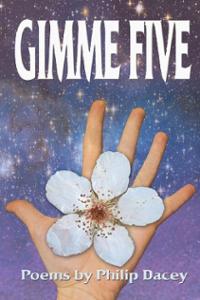Book Review
Philip Dacey, Gimme Five, Blue Light Press, 2013
by Lisa Vihos
It is always a pleasure for mind, ear, and heart to sit down with a book of poems by Philip Dacey in hand. His latest, Gimme Five, is no exception. While adhering to a form that the poet has found compelling over many years—that is, five, five-line stanzas—there is a wide range of mood and subject matter here. The “five-ness” of it all does not bear down on the reader or draw undue attention to itself. What we have here is a book of 55 (56 if you count the lovely dedication to his granddaughter Sorcha) highly readable and thoughtful poems that keep us wanting more.
Dacey writes in the author’s note, “I make no case for the significance of what seems to me a fundamentally arbitrary form—or format—beyond testifying that for me it has acted like a sculptor’s standard armature upon which he or she can build up an unlimited variety of shapes and configurations.”
And build he does. There are funny poems, bittersweet poems, and philosophical poems. The magic comes when the armature falls away and each poem takes us on a new path to some realm of the familiar, but always with a twist. From coming in late to a movie, to ruminating in a dream as to the exact location of the island of Java, to teaching a daughter to read, Dacey has no problem making the most commonplace thing extraordinary.
Many of the poems are about language, how we use and misuse it, and poetry itself. One of the language poems I especially like is “November 2000,” which begins:
After the election,
the English language,
which had taken such a beating,
flew to the Virgin Islands
for a rest.
Dacey is very good at turning something on its head, looking at it in a topsy-turvy way, as in “The Five Senses: A Bestiary:”
the small dog of the nose
rummaging in the wind
a stray
he never gets
anything substantialmouth
belly of a little
leviathan with a taste
for Jonah
who can no longer be found
I will leave ears, eyes, and fingers for you to encounter in your own time.
It is hard not to provide the entire five stanzas for these poems because in almost every case, Dacey uses enjambment across stanza breaks to carry us through. Here and there, a thought does come to an end at the end of a stanza, (as in “November 2000” above) but more often than not, the central idea of each poem flows through the entire five stanzas in such a manner that you cannot tidily break it down into component chunks. All five stanzas are required. One of my favorite examples of the poet’s skillful use of enjambment across lines and stanzas alike is “Two Years in One.”
In one 1939, Germany
invaded Poland; in the other,
I was born. My fingers
curled open; Pavel’s
curled shut. I marchedin circles to the tune
of my mother’s breasts
and saluted myself
without knowing it.
I was occupied, all right,the days knew me
from border to border.
The ghost of my Polish
great-grandmother stitched
a thread between meand a land where smoke
wrote names in the sky.
Swaddled by a headline,
I slept through one
death after anotherand woke up refreshed.
Now I think of booties
and boots, blue and black,
feet struggling
for a place on the earth.
I love how Dacey is so good at making one thing become another: hands stand in for lovers, a shoehorn slips into a poetic line, a dictionary becomes a place in which to be buried. Dacey is expert at taking you by the hand to go in one direction, and then deftly turning you round in quite another. If you write poetry, reading these poems will instantly make you want to try this “five over five” format. And, if you read poetry, then you will be endlessly glad that you picked up this book. As an opening epigraph tells us, “For every breath, five heartbeats,” so, either way, you will feel right at home in Dacey’s fives.
Lisa Vihos has two chapbooks, A Brief History of Mail (Pebblebrook Press, 2011) and The Accidental Present (Finishing Line Press, 2012). She is an associate editor of Stoneboat and an occasional guest blogger for The Best American Poetry digital.


